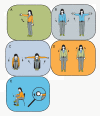Protocol for work place adjusted intelligent physical exercise reducing musculoskeletal pain in shoulder and neck (VIMS): a cluster randomized controlled trial
- PMID: 20687940
- PMCID: PMC2921353
- DOI: 10.1186/1471-2474-11-173
Protocol for work place adjusted intelligent physical exercise reducing musculoskeletal pain in shoulder and neck (VIMS): a cluster randomized controlled trial
Abstract
Background: Neck and shoulder complaints are common among employees in sedentary occupations characterized by intensive computer use. Specific strength training is a promising type of physical exercise for relieving neck and shoulder pain in office workers. However, the optimal combination of frequency and exercise duration, as well as the importance of exercise supervision, is unknown. The VIMS study investigates in a cluster randomized controlled design the effectiveness of different time wise combinations of specific strength training with identical accumulated volume, and the relevance of training supervision for safe and effective training.
Methods/design: A cluster randomized controlled trial of 20 weeks duration where employed office workers are randomized to 1 x 60 min, 3 x 20 min, 9 x 7 min per week of specific strength training with training supervision, to 3 x 20 min per week of specific strength training with a minimal amount of training supervision, or to a reference group without training. A questionnaire will be sent to 2000 employees in jobs characterized by intensive computer work. Employees with cardiovascular disease, trauma, hypertension, or serious chronic disease will be excluded. The main outcome measure is pain in the neck and shoulders at week 20.
Trial registration: The trial is registered at ClinicalTrials.gov, number NCT01027390.
Figures



Similar articles
-
Protocol for shoulder function training reducing musculoskeletal pain in shoulder and neck: a randomized controlled trial.BMC Musculoskelet Disord. 2011 Jan 14;12:14. doi: 10.1186/1471-2474-12-14. BMC Musculoskelet Disord. 2011. PMID: 21235752 Free PMC article. Clinical Trial.
-
Effect of workplace- versus home-based physical exercise on pain in healthcare workers: study protocol for a single blinded cluster randomized controlled trial.BMC Musculoskelet Disord. 2014 Apr 7;15:119. doi: 10.1186/1471-2474-15-119. BMC Musculoskelet Disord. 2014. PMID: 24708570 Free PMC article. Clinical Trial.
-
Effect of scapular function training on chronic pain in the neck/shoulder region: a randomized controlled trial.J Occup Rehabil. 2014 Jun;24(2):316-24. doi: 10.1007/s10926-013-9441-1. J Occup Rehabil. 2014. PMID: 23832167 Free PMC article. Clinical Trial.
-
Effects of biofeedback and strength training interventions on neck-shoulder sensory-motor responses among visual display unit users. A narrative review.J Electromyogr Kinesiol. 2024 Dec;79:102936. doi: 10.1016/j.jelekin.2024.102936. Epub 2024 Sep 20. J Electromyogr Kinesiol. 2024. PMID: 39321540 Review.
-
Workplace interventions for increasing standing or walking for decreasing musculoskeletal symptoms in sedentary workers.Cochrane Database Syst Rev. 2019 Nov 17;2019(11):CD012487. doi: 10.1002/14651858.CD012487.pub2. Cochrane Database Syst Rev. 2019. PMID: 31742666 Free PMC article.
Cited by
-
Resistance training in addition to multidisciplinary rehabilitation for patients with chronic pain in the low back: Study protocol.Contemp Clin Trials Commun. 2017 Apr 12;6:115-121. doi: 10.1016/j.conctc.2017.04.001. eCollection 2017 Jun. Contemp Clin Trials Commun. 2017. PMID: 29740641 Free PMC article.
-
Reliability of a simple physical therapist screening tool to assess errors during resistance exercises for musculoskeletal pain.Biomed Res Int. 2014;2014:961748. doi: 10.1155/2014/961748. Epub 2014 Mar 13. Biomed Res Int. 2014. PMID: 24738079 Free PMC article.
-
Modifiable individual and work-related factors associated with neck pain in 740 office workers: a cross-sectional study.Braz J Phys Ther. 2018 Jul-Aug;22(4):318-327. doi: 10.1016/j.bjpt.2018.03.003. Epub 2018 Mar 13. Braz J Phys Ther. 2018. PMID: 29606511 Free PMC article.
-
Influence of frequency and duration of strength training for effective management of neck and shoulder pain: a randomised controlled trial.Br J Sports Med. 2012 Nov;46(14):1004-10. doi: 10.1136/bjsports-2011-090813. Epub 2012 Jun 29. Br J Sports Med. 2012. PMID: 22753863 Free PMC article. Clinical Trial.
-
Exercises for mechanical neck disorders.Cochrane Database Syst Rev. 2015 Jan 28;1(1):CD004250. doi: 10.1002/14651858.CD004250.pub5. Cochrane Database Syst Rev. 2015. PMID: 25629215 Free PMC article.

